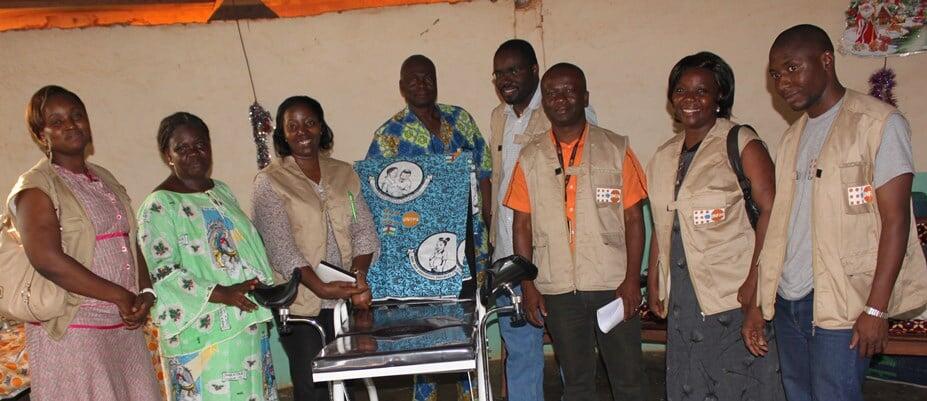Bangui, Central African Republic- The United Nations Population Fund, UNFPA has donated reproductive health and clean and safe delivery essentials, including beds for the welfare of pregnant women among Internally Displaced Persons (IDPs) in Bangui, capital of the strife-torn Central African Republic, within the framework of its mandate to provide emergency assistance to women and girls of reproductive age.
The security situation in the CAR has been deteriorating as inter-communal violence escalates leaving hundreds dead and over 512,000 people displaced in the capital Bangui alone.
UN estimates that about 935,000 people out of a population of 4.5 million have fled their homes while 2.2 million people need humanitarian aid.
There are 159, 750 women of child bearing age (15-49 years) with over 6,390 estimated pregnant women in Central African Republic (CAR).
At the St Bernard parish, one of the 67 spontaneous IDP sites in the capital city, UNFPA also donated a much needed delivery bed and arranged the makeshift delivery room.
The number of IDPs at the St Bernard site moved from a total of 9000, on 20th December when the UNFPA West and Central Africa regional director Benoit Kalasa visited, to almost 15000 after Christmas day with at least 350 pregnant women due to the upheavals that continue to affect Bangui.
Earlier, UNFPA West and Central Africa Regional Director Benoit Kalasa, who was accompanied by country office Humanitarian Coordinator Ms Aminata Seguetio, acting Country Representative Mr Hamadou Lougue as well as other staffs from the regional and country offices, had presented gifts for safe delivery to the head of the parish Father Tirbuce.
Father Tirbuce was very much touched when UNFPA surprised him with the bed, medical kits, and others for the safe delivery of babies.
He had expressed major concerns about the area used as delivery ward. “We don’t have a delivery bed. Women have to seat on a chair until it is labour time then we put a mat on the floor for them to deliver. Also because the room only has window guards, women hang cloths for privacy when someone is delivering”.
When they toured the parish and the facilities put in place for IDPs and saw the state of the makeshift delivery room, the UNFPA team decided to improve the room and work closely and directly with the three volunteer-midwives living on the site.
The delivery hall is a round hut-styled room, corrugated iron sheets roof serving as ceiling as well with no curtains. Few armchairs are in the room while cottons, syringes, drug bottles and other medical items are put on the only table in the room. A bench, plastic buckets and basins as well as kits for women who delivered could be seen in the room.
Few days later, the UNFPA team came back as promised on Christmas Eve. This time headed by the Regional Humanitarian Response and Preparedness Specialist, Mr Judicael Elidje, with more materials for the room.
The team tied the cloths around the room for privacy, reorganized the room and presented scales for babies and mothers in addition to delivery kits (each contains two gauze sheets, a plastic bag to put the placenta, a plastic to deliver on, gloves, razor blade to cut the umbilical cord and soap).
Mr ELidje reiterated Dr Kalasa message to father Tirbuce, “UNFPA has been assisting people across the country and will continue to do so directly or through our partner ie 20 national and international NGOs intervening countrywide”.
St Bernard site is an example of the many interventions of the UNFPA to safeguard civilians’ dignity with hygiene or dignity kits (toothbrush and toothpaste; a wrapper, tshirt, flip-flop, bucket, condoms, soap, pads and underwear for women, a towel and a sponge); make sure women deliver in proper conditions; and youths can fulfill their potentials.
Since December 8th, UNFPA has been delivering Reproductive Health kits on a daily basis to health facilities and IDPs spontaneous sites. It contributes to ensure delivery in safe condition as well as strengthen the prevention and response aspect of gender-based violence on IDPs sites in Bangui and in Bossangoa, Bouar, Kaga-Bandoro, Paoua and Zemio.
Alsmost 1 million Central Africans have been displaced as a result of the continuous violence. Over 1000 people have been killed in Bangui with many hundred others injured.
The country has been experiencing upheaval since last December when the Séléka rebel coalition launched a series of attacks, culminating in March with the toppling of former President François Bozizé.
So called Christian and Muslim militias have been engaged in attacks and counter-attacks mostly on civilians.


